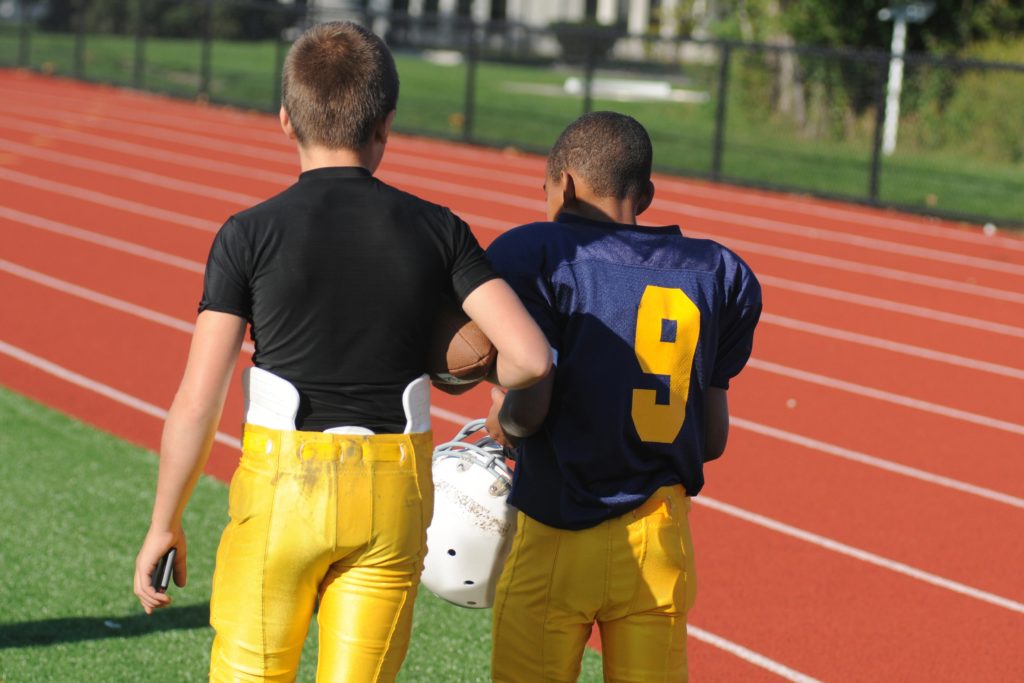
Juliette stopped in her tracks.
She could see from halfway down the hall that her locker had been trashed. Covered with photos, markings, and fake blood, it looked like a crime scene. As she got closer, she could see printed photos someone had taken of her while she was dressing in P.E. She ran to the locker and yanked off and crumpled the photos as fast as she could. (With friends like this, it’s no wonder there’s a rise in depression in teen girls.)
As she stood staring at her locker frozen, her face burning with humiliation, she couldn’t think… Then, in one sweeping motion, she pulled all the trash off her locker door and wadded it up.
Only then did she look up and see the bystanders, the sidelong glances, and hear the snickering muffled giggles of her “friends” gathered around watching.
She grabbed her books, slammed her locker door and shot off to class.
Juliette sank into her seat, head down, heart-broken, and wondered why?? Who did this and why?
She felt betrayed, angry, heartsick. And abandoned.
She didn’t say a word for the rest of the day, just kept her head down and shot out the front door when the bell rang to go home.
Her mom was waiting outside, and Juliette jumped in the car, put her face on her lap and said, “Drive!”
“What’s the matter, Jules?” Her mom was alarmed. She’d never seen her 13 year-old like this.
“Just drive.”
So her mom put the car in gear and did.
Teen Trauma Triggered by Ridicule and Humiliation
Once home, Juliette flew upstairs, slammed her door, and locked it. She dug her phone out of her purse for the first time since she saw the locker. Two hundred and thirteen messages. She wondered if there might be apologies… so she opened one …then another.
NO apologies. Total strangers making jokes, rows of laughing faces, some even calling her crude names. The photos she saw on her locker had gone viral. All over Instagram, Pinterest, facebook…
Her friends were silent.
She thought she would die. How could she ever show her face in that school again? She could never leave her room again. She covered her head and sobbed.
“Jules..? Honey, are you OK? Did something happen?”
“Mom, I just want to be alone.”
This isn’t something my parents can help with. I’m alone with this nightmare, she thought.
So a traumatic experience begins to fester…
Scenes like this aren’t uncommon if you have kids. You got her into ballet at 3, then gymnastics at 5, then soccer at 7. Always hoping to help her gain confidence in herself, to help make the transitions of childhood to adolescence, and adolescence to adulthood advance more smoothly. To help her develop an anchor within herself that would see her though the storms, and the things that others did.
And your happy, socially-balanced child does great with her activities, her friends, slumber parties, and sports events.
Until the day she’s publicly humiliated.
The humiliation can happen on Snapchat, Facebook, Instagram, and other social media sites. It can happen in text messaging. Or it can happen at school and at slumber parties.
And, while the cruel embarrassments and humiliations children and teens impose on each other are terrible — and seem almost insurmountable for some students– it’s what follows if they can’t get past it that can be life-threatening.
Believe it.
Depression in Teen Girls Can Be Deadly

Sometimes, what we parents see is a child, preteen, or adolescent, who is acting differently. Who won’t talk to us. Since we don’t know what they’ve faced at school, we may be clueless about the trauma they’re experiencing. We may think they’re just being moody teenagers.
Sadly, the trauma may cause such a deep pain that they can’t find words to “get it off their chest…” So they may isolate, huddle, and try to figure out how to cope on their own.
An experience like Juliette endured isn’t usually a single event. There’s the aftermath. Someone in her shoes may skip school for a few days until she can muster the courage to step out and go again. But even when they do go, there are whispers, snickers, more text messages.
And sometimes even more incidents that go from bad to worse.
The stress continues, long after we parents think it should be over.
Or we may never know it happened in the first place.
And as we often talk about, prolonged severe stress can result in that pruning of the dendrites and dendritic spines that destroys synaptic connections between brain cells. And depending on how severe the pruning is, and how long it continues… the outcome is often depression.
“But she’s a kid…” you may think. “She doesn’t have severe stress. How could she?”
It’s an unfortunate miscalculation to think that a child can’t experience severe stress. Her world is her reality. And she’s been building that world since she can remember. If everything that makes her world a warm and inviting place of support, caring, and acceptance is disassembled and left in shambles, then her world is shattered.
And as her parents, you can’t fix it.
That’s not to say you can’t be a comfort and a support. But no one can fix her world for her but herself. A pretty daunting task for a devastated 13 year-old.
It turns out that teen depression rates have been increasing for years, but the rate of depression in girls is rising faster than it is in boys.
Teen Depression is Threatening Our Children
Girls and boys. But is there difference in how much and how often it strikes? Why are teen girls becoming depressed more often than boys?
For one thing, by the age of 15, girls are actually twice as likely to become depressed as boys. It’s surprising, isn’t it? …but there are reasons.
The smart phone, for instance. By the mid 90’s, both boys and girls were using them. And those babies born by then were the first generation to live out their entire lives in the age of smart phones. Those babies are 25 this year.
Let’s hear from those young women, shall we?
A team of researchers analyzed 3 surveys that included 200,000 females in the US and the UK. And…they learned some things.
For example:
Fill a classroom with 25 teens, and give them the freedom to use their smart phones. Then, walk up and down the aisles and glance at their screens. You know what you’ll see, first thing?
They’re not doing the same things.

The boys are playing games… on their smart phones, or talking about sports, and texting each other about the games.
The girls? They’re texting, and on social media. What are they texting about ? Their appearance, their clothes, their hair…and someone else’s appearance, clothes, and hair.
And when one sends off a text, she’s reassured that she’s accepted when she receives a response right back. No pauses.
If there’s a pause before she receives a response…because maybe the other girl is in the restroom, or is carrying too much in her arms to text easily, the first girl begins to feel dismissed.
Anxiety rises.
And that knee-jerk reaction happens over and over and over, day and night, month after month…year after year.
Hurt Feelings, Misunderstandings, Feeling Left Out
Now, add to that the pecking order on social media platforms. The girl with 8 likes is shamed when compared to the girls with 500 likes and shares. And don’t kid yourself. Those comparisons are made. Ruthlessly.
Images that create a fantasy of one girl’s life lead to others feeling ashamed of their “plain” homes, clothes, and activities. None of this is grounded in the real world. But then smart phones and social media have little to do with the real world.

The pressure is intense enough that one study found that girls who compare themselves to other girls on social media were more likely to be depressed.
And get this: in 2017, a full one-fifth of teen girls said they’re suffering from major depression. One Fifth!
Then, there are the cruel “jokes” some girls play on others, where messages, videos taken without permission, and compromising photos are sent out and go viral. And young girls become convinced there is no remedy to restore their lives after such exposure, and at the tender age of 10, or 12, or 14… they end their lives.
So is it all social media? No.
Don’t boys use social media? Yes, they do.
But these researchers also found that social media and the interactions there have a stronger effect on girls than boys.
They found that 15% of girls who were on social media only 30 minutes a day, due to other activities, family rules, etc, were unhappy. But 26% of girls who were on social media 6 hours a day were unhappy.
Now let’s look at the boys. Only 11% of the boys who were on social media 30 minutes a day were unhappy. And those boys who were on social media 6 hours a day? Only 18% of them were unhappy.

So what is it about girls that more of them seem to succumb to depression from social media?
Researchers found it was that being popular, and having positive interactions with others is tied to their sense of satisfaction, happiness, and confidence.
Social media can either build up the social ties a teen girl enjoys, or it can destroy them through bullying, shame, and conflict.
And we can’t forget that pressures about image and appearance continue to increase at this age…
Now… what can parents do?
One obvious step might be to postpone your child’s access to social media. That message is being disseminated by experts on adolescent mental health far and wide.
While it’s illegal for a child to have a social media profile before the age of 13, parents might consider extending a moratorium on social media use longer than that.
The social pressure among teens to excel on social media is not aimed at their growth, self-confidence, or character, but is actually designed to pull them into an addictive activity.
We all know Mark Zuckerberg as co-founder of facebook. But do you know Sean Parker? He joined Zuckerberg 5 months after Facebook was launched as a student directory, and Zuckerberg credits him with the phenomenal growth it enjoyed. Which made him a billionaire.
Referring to facebook, Parker said,“It’s a social-validation feedback loop … exactly the kind of thing that a hacker like myself would come up with, because you’re exploiting a vulnerability in human psychology.”
He went on to say that social media like Facebook “…literally changes your relationship with society, with each other. It probably interferes with productivity in weird ways. God only knows what it’s doing to our children’s brains,” he said.

Children aren’t equipped with the life experience or brain development to see these sites for what they are. Rather, they’re swept up in the tidal wave that is adolescence and the need for social acceptance at probably the most vulnerable time of their lives.
As parents, they need us to be proactive, to give them time to develop the life skills to keep such activities in their place.
They need time to just grow, physically, mentally, emotionally, and socially. To develop healthy relationships with their peers, and to survive their preteens, teens, and early adulthood so they can go on to become the best they can be.
Depression in Teen Girls Needs to Slow Down. Let’s Do Something.
Would this approach prevent depression in girls?
No, no, of course not. But it just might protect your daughter from depression. And maybe her friends. And maybe some of their friends.
By finding opportunities to get your daughters talking with their friends about the dangers and risks of social media, and using text messaging less… and in more responsible ways… perhaps we can open their eyes. And a lot of others.
Maybe that could go viral.
Maybe a new culture could emerge where our daughters lived well, and survived their own adolescence… and could go on to have daughters of their own.
After all, that’s what we want for them, right?
Ketamine For Treatment Resistant Disorders
If your daughter — or son — has developed depression, and medicines aren’t helping, call us. Let’s talk about IV ketamine treatment — which shows a much higher response rate than antidepressants.

The sooner your teen’s disorder is treated and relieved, the sooner her resilience is restored, the better equipped she (or he) will be to tackle the life issues she faces as she grows to adulthood.
Depression in teen girls is increasing, but we’re not powerless to fight it. Let’s work together to turn the tide on disorders that result from things like the intense stress of social media.
And if your teen is struggling without relief, learn about IV ketamine treatment. It’s saving lives.
To the restoration of your best self…and your teen’s,

To the restoration of your best self,

Extremely well written. Insightful, appropriate, and validating. Good job, author.
Thank you! Such an important topic — please feel free to share it.
How can I help? My daughter went through this and I have always wanted to help other teen girls. This is really so bad and has always weighted on my heart. My daughter is now 20 and is still working through it all.
How generous of you to want to reach out to other girls after what your own daughter went through! I’m working on a blog post tonight about meanness and what one school is doing to address it, but I’d love to hear about what has worked in your schools or with your kids. Let’s share what works and what helps. Just this week, Ad Council announced a wonderful resource on teen bullying through Becauseofyou.org — a great resource to have teens be the ones who make change happen.
Fantastic article and something all parents of teen girls should read. The one issue I had with the article is the ending that if medicines are not working! What about good therapy and perhaps CBT with TMS something we have been doing for some time and seeing fantastic results. I would see Ketamine as more invasive than TMS but that is a debatable question. Since neither is FDA cleared for treating teens the only study I know for TMS and teens is out of Mayo Clinic. Has there been any research on Ketamine in teens?
Thank you! There are ongoing studies with teens, and I’ve treated a number of teens with treatment resistant depression and PTSD very successfully with ketamine infusions. There is also a cohort of teens included in the retrospective study I published this winter. Given the risk and rapid onset of depression and hopelessness in some teens, we desperately need fast-acting and effective treatments.